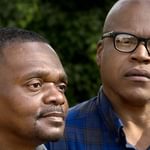
On the third anniversary of their groundbreaking exoneration, a new report by the Center for Death Penalty Litigation (CDPL) reviews in-depth the long path from wrongful convictions and death sentences to freedom traveled by former North Carolina death-row prisoners Henry McCollum and Leon Brown.
By the time DNA evidence exonerated the brothers of the 1983 rape and murder of 11-year-old Sabrina Buie, McCollum had spent 30 years on death row and Brown was serving a life sentence for Buie’s rape, after his murder conviction and death sentence had been overturned. Justice Antonin Scalia had singled out the case as epitomizing why there should be a death penalty.
According to the report, if not for a single cigarette butt, “Henry and Leon would likely have remained in prison for the rest of their lives. Henry might have been executed.”
Although no physical evidence connected the brothers to the murder, the 19-year-old McCollum had signed a written confession that asserted he and three others had raped Buie and murdered her by stuffing her panties down her throat. His younger brother, Leon Brown, then 15 years old, also confessed to the crime. However, the CDPL report, Saved From Execution: The Unlikely Exoneration of Henry McCollum, notes that the two intellectually disabled teenagers had been “naive, powerless, and intimidated by a cadre of law enforcement officers … into signing false confessions. Every gory detail in those confessions,” the report recounts, “was provided by investigators …, but law enforcement never followed up on clues that might have led to the real killer. An overzealous prosecutor with a flair for courtroom theatrics hyped the manufactured evidence. And the state illegally withheld facts that might have allowed Henry and Leon’s attorneys to prove their innocence.”
The CDPL represented McCollum for two decades. Gretchen Engel, the Center’s Executive Director, said the case “shows us the power that law enforcement and prosecutors have in our system, and how that power can be abused. It shows us how hard it is to uncover a wrongful conviction. It shows us that even cases we think are airtight can get the facts entirely wrong.”
In 2005, testing on the cigarette butt had produced DNA that did not match either McCollum or Brown, but their convictions remained unaffected. Then, in 2009, Brown — having exhausted his appeals in his non-capital case — sought review from the North Carolina Innocence Inquiry Commission, one of the few such commissions in existence in the country. In 2014, the Inquiry Commission ordered more advanced DNA testing of the cigarette butt, and the results matched another man who had lived around the corner from the Buies in 1983 and who raped and killed another young woman later that year.
In 2015, Gov. Pat McCrory granted McCollum and Brown pardons based on innocence. Since being freed from 30 years of incarceration (including 10 years in solitary confinement and numerous sexual assaults at the hands of other prisoners), Brown has been diagnosed with schizophrenia and bipolar disorder and repeatedly hospitalized for mental health problems, including hallucinations and depression.
As the anniversary of McCollum and Brown’s exoneration approached, a North Carolina state representative posted a photograph of the state’s electric chair on his Facebook page, with the tagline “#MakeTheChairGreatAgain.” Representative Justin Burr said “Justice was served to nearly 200 convicted murders in this chair. The chair has been in the possession of our state history museum since 2000. I think it’s time to put it back to work.”
Saved From Execution: The Unlikely Exoneration of Henry McCollum, Center for Death Penalty Litigation, August 31, 2017; Press Release, On third anniversary, new report chronicles N.C.’s most shocking death row exoneration, Center for Death Penalty Litigation, August 31, 2017; S. Carson, Three Years Free after 30 Years of Innocence in Prison, Public News Service, August 31, 2017; M. Locke, J. Neff, Pardoned brothers’ payout triggers fight over who gets a cut, News & Observer, April 28, 2017; G. Price, Make the Electric Chair Great Again, North Carolina Lawmaker Says, Co-Opting Trump’s Slogan, Newsweek, September 1, 2017.
Photo courtesy of Corey Lowenstein, News & Observer.
Read the findings of the North Carolina Innocence Inquiry Commission in State v. McCollum/Brown. See Innocence.
Innocence
Nov 25, 2024

Earwitness Podcast Creator Beth Shelburne on Toforest Johnson’s Case
Innocence
Oct 15, 2024

